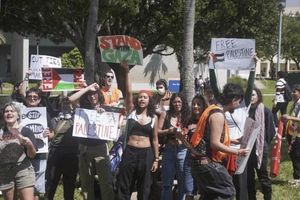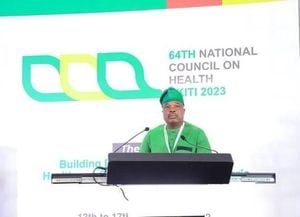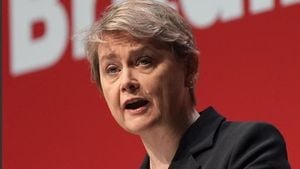In a year marked by political turbulence and shifting allegiances, Manchester’s Hulme district is set to become the epicenter of Britain’s independent left. From October 9 to 12, 2025, The World Transformed (TWT) festival unfolds with a bold new message: the British left is reorganizing, reimagining, and ready to challenge both Labour and the resurgent right.
Once a lively but unofficial fringe event running alongside the Labour Party Conference, TWT has now struck out on its own. According to Sky News, the festival’s organizers made the decision to go independent after reflecting on their role in the wake of Sir Keir Starmer’s election victory. As Hope Worsdale, a longtime organizer, put it, “It no longer made any sense to be a fringe festival of the Labour conference. We need a space for the independent left to come together.”
This year’s festival features an ambitious program: 120 events over four days, with an expected 3,000 attendees. The gathering brings together more than 75 grassroots groups, trade unions, and activist networks—an impressive coalition aiming to strategize, debate, and, perhaps most importantly, party. Cultural highlights are as much a part of the agenda as politics, with Dele Sosimi and his Afrobeat Orchestra headlining the Saturday night slot and a mysterious host presiding over the festival’s now-infamous pub quiz on Friday. (Back in 2018, that was none other than Ed Miliband, drawing a crowd of 10,000 activists.)
But the heart of TWT lies in its daily assemblies, designed to foster “genuinely constructive debates about what we should do and how we should do it,” as described by organizers. The festival’s headline speakers—Zack Polanski, Jeremy Corbyn, Zarah Sultana, and Brian Leishman—signal a left that is both diverse and determined to break new ground outside Labour’s shadow.
The timing of TWT is telling. It comes just a week after Labour’s annual conference, but the relationship between the two is more distant than ever. The festival’s split from Labour reflects a broader shift among progressive voters, many of whom feel alienated by what they see as Starmer’s rightward drift. “They have shifted the values of Labour so radically since the last election, broken promise after promise, attacked civil liberties… there’s been such a suite of terrible decisions that mean people who are generally progressive and generally left wing feel like they have to take their organising elsewhere,” Worsdale told Sky News.
This sense of estrangement is echoed in polling data. Labour is bleeding support on all sides: an Ipsos poll from September 2025 shows the party losing 13% of its vote to Reform UK, 10% to the Greens, and another 10% to the Liberal Democrats. According to Vox Political, Labour’s strategy of placating populist narratives—especially on immigration and policing—has only validated the framing of its right-wing rivals, making it look like “a slightly more polite version of the Tories.”
The stakes for the left are high, and the path forward is anything but straightforward. With the rise of the Greens, socialist independents, and the newly formed Your Party, questions about unity and collaboration loom large. One activist from the We Deserve Better organization, which is campaigning for a left-wing electoral alliance, told Sky News that collaboration is “vital” if the left hopes to make gains under Britain’s first-past-the-post system. Yet, even among the left’s new standard-bearers, unity is fragile. The public spat last month between Your Party co-leaders Jeremy Corbyn and Zarah Sultana cast a shadow over the movement, though the pair put on a united front at a Liverpool rally on the eve of the festival. Sultana publicly apologized, promising “no more of that.”
“It’s not ideal,” the activist admitted. “Hopefully they are back on track... a lot of collaboration is happening at the grassroots and we need to make sure it’s formalized so we can beat Labour and the right, we need to put on a united front.” They pointed to closely contested seats like Ilford North, where Health Secretary Wes Streeting narrowly held on by just 528 votes after a challenge from British-Palestinian candidate Leanne Mohamad, who ran in protest against Labour’s stance on Gaza. In Hackney, the Greens are pushing to elect their first directly elected mayor next May, buoyed by support from the Hackney Independent Socialist Group of councillors.
For many, the priority is less about party labels and more about rallying behind candidates who share socialist values—on public ownership, immigration, and civil liberties—regardless of whether they stand for the Greens, independents, or Your Party. As the We Deserve Better activist put it, “The World Transformed reflects a general reorientation of the left outside of Labour. If they are taking these places for granted, we are going to win. If we unite as the left then we can win even bigger. Bring it on.”
Labour, meanwhile, faces mounting criticism from all directions. According to Vox Political, the party has spent the last three years “trying to placate populist narratives—particularly on immigration, policing and ‘British values’—rather than challenge them.” This approach, the article argues, not only fails to neutralize the threat from Reform UK but actually entrenches its framing. The liberal, urban, university-educated base that once formed Labour’s core is now deeply uneasy, and many are considering tactical shifts to the Greens or Liberal Democrats, especially if Labour appears to have already secured power or become indistinguishable from the Conservatives.
Labour’s communication strategy has also come under fire. The party has been criticized for avoiding aggressive framing and rarely challenging media distortions, a stark contrast to Reform UK’s mastery of media manipulation. As Vox Political notes, “Populists win not because they have better ideas, but because they have better stories. Reform’s is simple: ‘They’ve all betrayed you; we’re the only honest ones left.’ Labour’s counter-story is muddled, managerial, and apologetic. You can’t beat a myth with a spreadsheet.”
Some Labour MPs have expressed regret over TWT’s decision to branch away from the party, but acknowledge it was inevitable given the changing direction of Labour. One MP told Sky News that the festival “was full of people for the first time in their life who were excited about politics and had a leadership looking at how it could challenge the biggest issues in our country.” Now, they say, “Debates could be heated but it was always a place for intellectual discussion and that inside the Labour Party is now dead.” Still, the MP added, Labour has bigger worries on the horizon, with a budget round the corner and potentially disastrous local elections in May.
Looking ahead, the British left faces a daunting landscape. As Vox Political warns, unless Reform UK succumbs to internal implosion, it stands to gain ground, potentially steering the UK toward a future more reminiscent of Trump’s America than Macron’s France. The only way forward, many believe, is for the left to unite, coordinate, and offer a compelling alternative story—one that can inspire hope rather than simply manage decline.
For now, Manchester’s TWT festival stands as both a rallying cry and a test for the independent left. Whether it marks the beginning of a new era or just another chapter in Britain’s ongoing political drama remains to be seen, but one thing is clear: the battle for the soul of the left is far from over.




